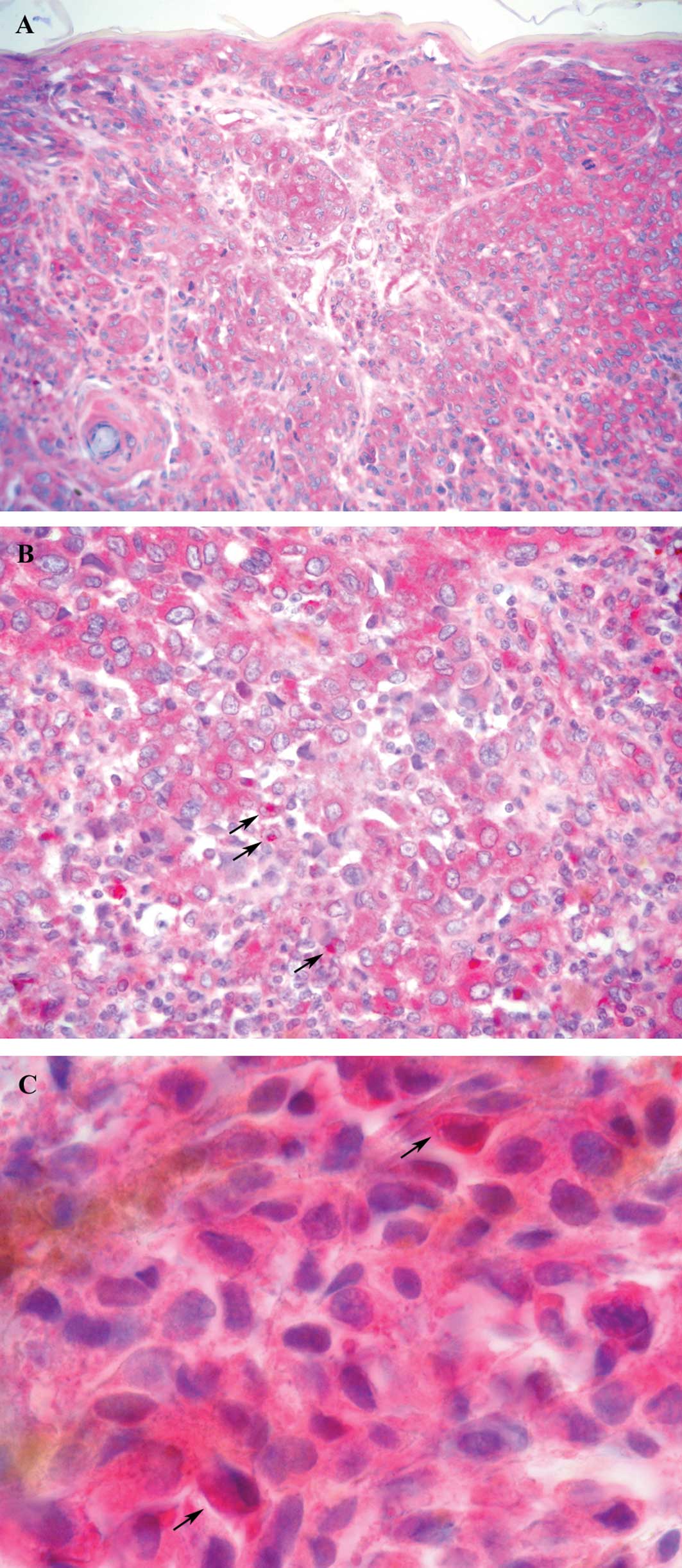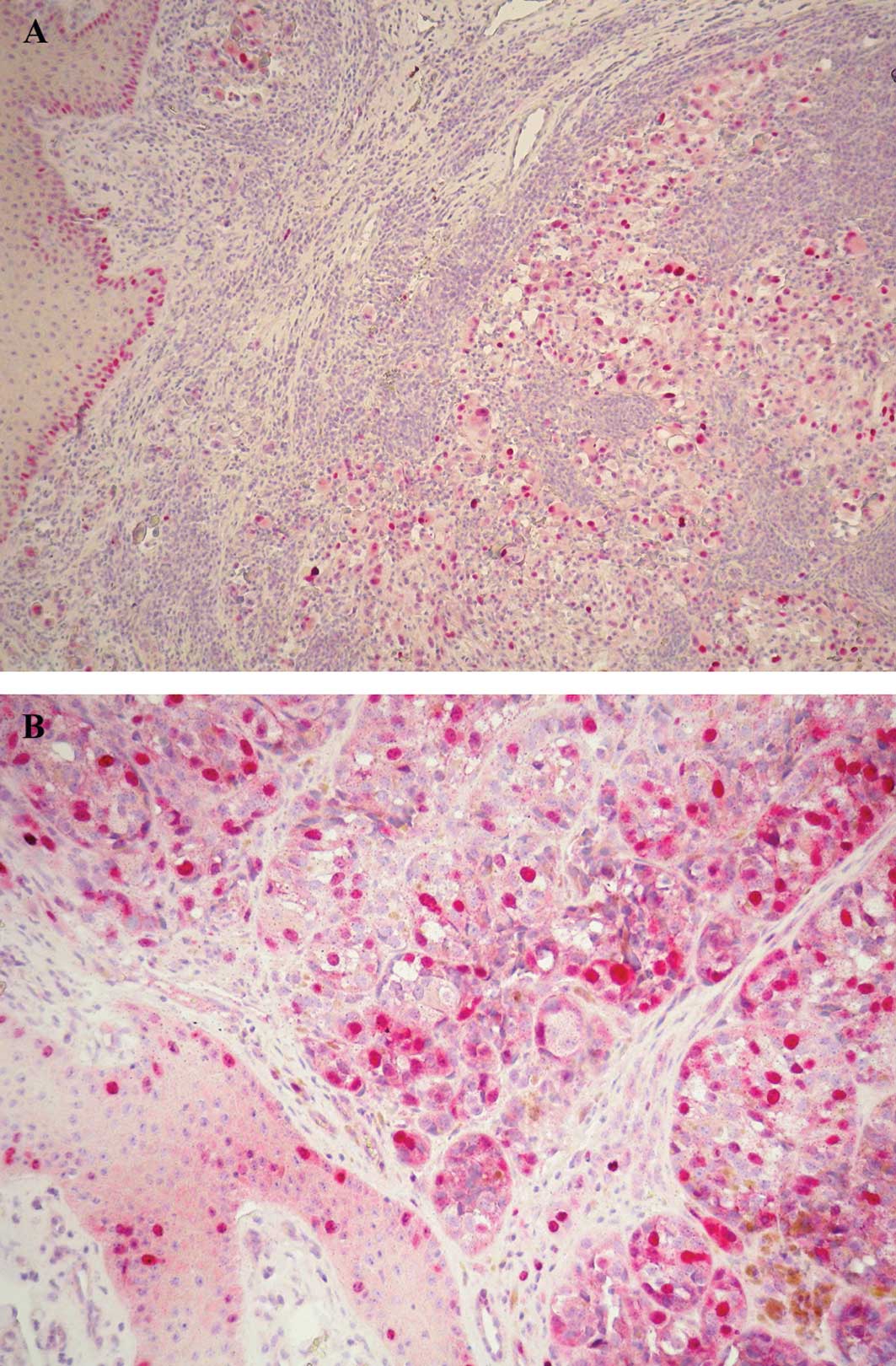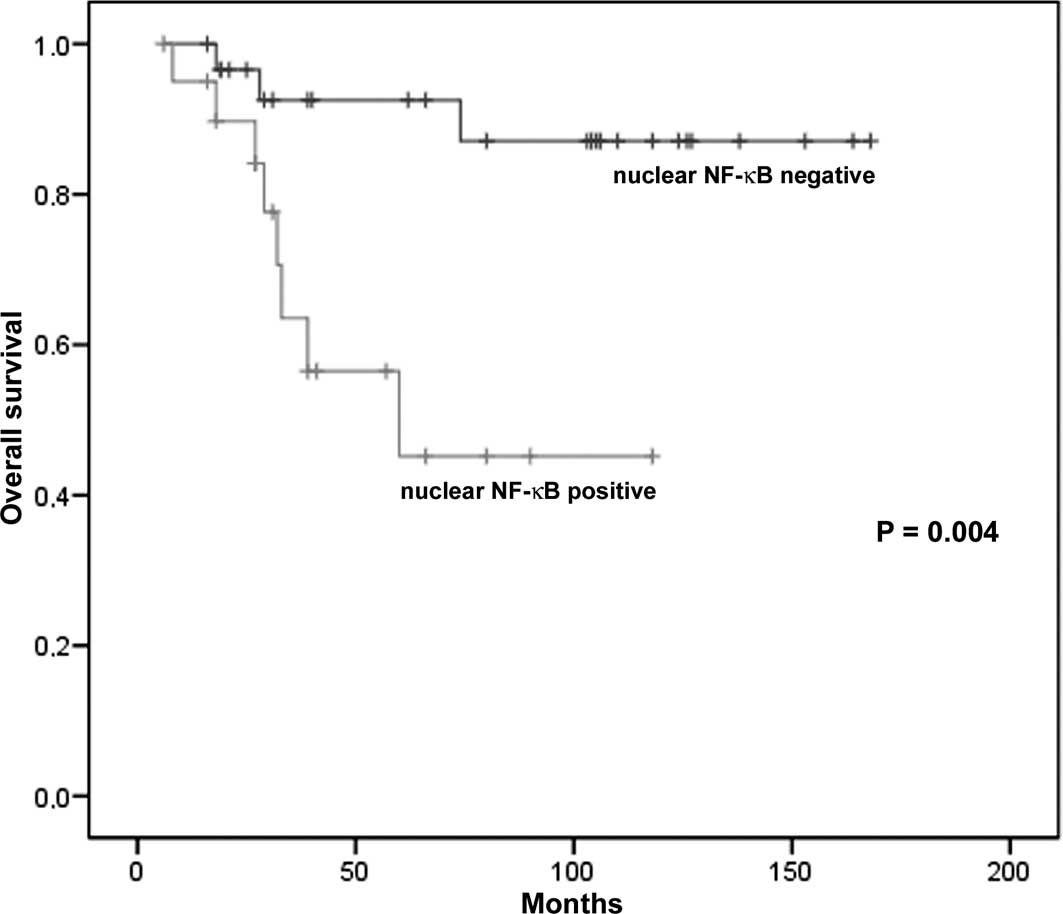|
1
|
Pacifico F and Leonardi A: NF-κB in solid
tumors. Biochem Pharmacol. 72:1142–1152. 2006.
|
|
2
|
Amiri KI and Richmond A: Role of nuclear
factor-κB in melanoma. Cancer Metastasis Rev. 24:301–313. 2005.
|
|
3
|
Meteoglu I, Erdogdu IH, Meydan N, Erkus M
and Barutca S: NF-kappaB expression correlates with apoptosis and
angiogenesis in clear cell renal cell carcinoma tissues. J Exp Clin
Cancer Res. 27:532008. View Article : Google Scholar : PubMed/NCBI
|
|
4
|
Ueda Y and Richmond A: NF-κB activation in
melanoma. Pigment Cell Res. 19:112–124. 2006.
|
|
5
|
Poser I and Bosserhoff AK: Transcription
factors involved in development and progression of malignant
melanoma. Histol Histopathol. 19:173–188. 2004.PubMed/NCBI
|
|
6
|
Ghosh S and Karin M: Missing pieces in the
NF-kappaB puzzle. Cell. 109:S81–S96. 2002. View Article : Google Scholar : PubMed/NCBI
|
|
7
|
Naugler WE and Karin M: NF-κB and
cancer-identifying targets and mechanisms. Curr Opin Genet Dev.
18:19–26. 2008.
|
|
8
|
Yang J, Pan WH, Clawson GA and Richmond A:
Systemic targeting inhibitor of kappaB kinase inhibits melanoma
tumor growth. Cancer Res. 67:3127–3134. 2007. View Article : Google Scholar : PubMed/NCBI
|
|
9
|
Dhawan P and Richmond A: A novel NF-kappa
B-inducing kinase-MAPK signaling pathway up-regulates NF-kappa B
activity in melanoma cells. J Biol Chem. 277:7920–7928. 2002.
View Article : Google Scholar : PubMed/NCBI
|
|
10
|
McNulty SE, Tohidian NB and Meyskens FL:
RelA, p50 and inhibitor of kappa B alpha are elevated in human
metastatic melanoma cells and respond aberrantly to ultraviolet
light B. Pigment Cell Res. 14:456–465. 2001. View Article : Google Scholar : PubMed/NCBI
|
|
11
|
McNulty SE, Del Rosario R, Cen D, Meyskens
FL Jr and Yang S: Comparative expression of NF-kappaB proteins in
melanocytes of normal skin vs. benign intradermal naevus and human
metastatic melanoma biopsies. Pigment Cell Res. 17:173–180. 2004.
View Article : Google Scholar : PubMed/NCBI
|
|
12
|
Huang S, DeGuzman A, Bucana CD and Fidler
IJ: Level of interleukin-8 expression by metastatic human melanoma
cells directly correlates with constitutive NF-kappaB activity.
Cytokines Cell Mol Ther. 6:9–17. 2000. View Article : Google Scholar : PubMed/NCBI
|
|
13
|
Payne AS and Cornelius LA: The role of
chemokines in melanoma tumor growth and metastasis. J Invest
Dermatol. 118:915–922. 2002. View Article : Google Scholar : PubMed/NCBI
|
|
14
|
Richmond A: NF-kappa B, chemokine gene
transcription and tumour growth. Nat Rev Immunol. 2:664–674. 2002.
View Article : Google Scholar : PubMed/NCBI
|
|
15
|
Salvesen GS and Duckett CS: Apoptosis: IAP
proteins: blocking the road to death’s road. Nat Rev Mol Cell Biol.
3:401–410. 2002.
|
|
16
|
Altieri DC: The case for survivin as a
regulator of microtubule dynamics and cell-death decisions. Curr
Opin Cell Biol. 18:609–615. 2006. View Article : Google Scholar : PubMed/NCBI
|
|
17
|
Altieri DC: Validating survivin as a
cancer therapeutic target. Nat Rev Cancer. 3:46–54. 2003.
View Article : Google Scholar : PubMed/NCBI
|
|
18
|
Zaffaroni N, Pennati M and Daidone MG:
Survivin as a target for new anticancer interventions. J Cell Mol
Med. 9:360–372. 2005. View Article : Google Scholar : PubMed/NCBI
|
|
19
|
Piras F, Perra MT, Murtas D, Minerba L,
Floris C, Maxia C, Demurtas P, Ugalde J, Ribatti D and Sirigu P:
Combinations of apoptosis and cell-cycle control biomarkers predict
the outcome of human melanoma. Oncol Rep. 20:271–277.
2008.PubMed/NCBI
|
|
20
|
Mirza A, McGuirk M and Hockenberry TN:
Human survivin is negatively regulated by wild-type p53 and
participate in p53-dependent apoptotic pathway. Oncogene.
21:2613–2622. 2002. View Article : Google Scholar : PubMed/NCBI
|
|
21
|
Mees C, Nemunaitis J and Senzer N:
Transcription factors: their potential as targets for an
individualized therapeutic approach to cancer. Cancer Gene Ther.
16:103–112. 2009. View Article : Google Scholar : PubMed/NCBI
|
|
22
|
Iyer NG, Chin SF, Ozdag H, Daigo Y, Hu DE,
Cariati M, Brindle K, Aparicio S and Caldas C: p300 regulates
p53-dependent apoptosis after DNA damage in colorectal cancer cells
by modulation of PUMA/p21 levels. Proc Natl Acad Sci USA.
101:7386–7391. 2004. View Article : Google Scholar : PubMed/NCBI
|
|
23
|
Sirigu P, Piras F, Minerba L, Murtas D,
Maxia C, Colombari R, Corbu A, Perra MT and Ugalde J: Prognostic
prediction of the immunohistochemical expression of p16 and p53 in
cutaneous melanoma: a comparison of two populations from different
geographical regions. Eur J Histochem. 50:191–198. 2006.
|
|
24
|
Ryan KM, O’Prey J and Vousden KH: Loss of
nuclear factor-κB is tumor promoting but does not substitute for
loss of p53. Cancer Res. 64:4415–4418. 2004.
|
|
25
|
Fridman JS and Lowe SW: Control of
apoptosis by p53. Oncogene. 22:9030–9040. 2003. View Article : Google Scholar : PubMed/NCBI
|
|
26
|
Zuckerman V, Wolyniec K, Sionov RV, Haupt
S and Haupt Y: Tumour suppression by p53: the importance of
apoptosis and cellular senescence. J Pathol. 219:3–15.
2009.PubMed/NCBI
|
|
27
|
Olivier M, Hussain SP, Caron de Fromentel
C, Hainaut P and Harris CC: TP53 mutation spectra and load: a tool
for generating hypotheses on the etiology of cancer. IARC Sci Publ.
157:247–270. 2004.PubMed/NCBI
|
|
28
|
Culmsee C, Siewe J, Junker V, Retiounskaia
M, Schwarz S, Camandola S, El-Metainy S, Behnke H, Mattson MP and
Krieglstein J: Reciprocal inhibition of p53 and nuclear
factor-kappaB transcriptional activities determines cell survival
or death in neurons. J Neurosci. 23:8586–8595. 2003.PubMed/NCBI
|
|
29
|
Wang J, Ouyang W, Li J, Wei L, Ma Q, Zhang
Z, Tong Q, He J and Huang C: Loss of tumor suppressor p53 decreases
PTEN expression and enhances signaling pathways leading to
activation of activator protein 1 and nuclear factor-kappaB induced
by UV radiation. Cancer Res. 65:6601–6611. 2005. View Article : Google Scholar : PubMed/NCBI
|
|
30
|
Shao J, Fujiwara T, Kadowaki Y, Fukazawa
T, Waku T, Itoshima T, Yamatsuji T, Nishizaki M, Roth JA and Tanaka
N: Overexpression of the wild-type p53 gene inhibits NF-kappaB
activity and synergizes with aspirin to induce apoptosis in human
colon cancer cells. Oncogene. 19:726–736. 2000. View Article : Google Scholar : PubMed/NCBI
|
|
31
|
Clark WH Jr, Elder DE, Guerry D IV,
Braitman LE, Trock BJ, Schultz D, Synnestvedt M and Halpern AC:
Model predicting survival in stage I melanoma based on tumor
progression. J Natl Cancer Inst. 81:1893–1904. 1989. View Article : Google Scholar : PubMed/NCBI
|
|
32
|
Greene FL, Page DL, Fleming ID, Fritz A,
Balch CM, Haller DG and Morrow M: American Joint Committee on
Cancer Staging Manual. 6th edition. Springer; Philadelphia: 2002,
View Article : Google Scholar
|
|
33
|
Montagut C, Tusquets I, Ferrer B,
Corominas JM, Bellosillo B, Campas C, Suarez M, Fabregat X, Campo
E, Gascon P, Serrano S, Fernandez PL, Rovira A and Albanell J:
Activation of nuclear factor-kappa B is linked to resistance to
neoadjuvant chemotherapy in breast cancer patients. Endocr Relat
Cancer. 13:607–616. 2006. View Article : Google Scholar : PubMed/NCBI
|
|
34
|
Zhang Z, Ma J, Li N, Sun N and Wang C:
Expression of nuclear factor-kappaB and its clinical significance
in non-small-cell lung cancer. Ann Thorac Surg. 82:243–248. 2006.
View Article : Google Scholar : PubMed/NCBI
|
|
35
|
Levidou G, Korkolopoulou P, Nikiteas N,
Tzanakis N, Thymara I, Saetta AA, Tsigris C, Rallis G, Vlasis K and
Patsouris E: Expression of nuclear factor kappaB in human gastric
carcinoma: relationship with I kappaB a and prognostic
significance. Virchows Arch. 450:519–527. 2007. View Article : Google Scholar : PubMed/NCBI
|
|
36
|
Izzo JG, Malhotra U, Wu TT, Luthra R,
Correa AM, Swisher SG, Hofstetter W, Chao KS, Hung MC and Ajani JA:
Clinical biology of esophageal adenocarcinoma after surgery is
influenced by nuclear factor-kappaB expression. Cancer Epidemiol
Biomarkers Prev. 16:1200–1205. 2007. View Article : Google Scholar : PubMed/NCBI
|
|
37
|
Weichert W, Boehm M, Gekeler V, Bahra M,
Langrehr J, Neuhaus P, Denkert C, Imre G, Weller C, Hofmann HP,
Niesporek S, Jacob J, Dietel M, Scheidereit C and Kristiansen G:
High expression of RelA/p65 is associated with activation of
nuclear factor-kappaB-dependent signaling in pancreatic cancer and
marks a patient population with poor prognosis. Br J Cancer.
97:523–530. 2007. View Article : Google Scholar : PubMed/NCBI
|
|
38
|
Lessard L, Karakiewicz PI, Bellon-Gagnon
P, Alam-Fahmy M, Ismail HA, Mes-Masson AM and Saad F: Nuclear
localization of nuclear factor-kappaB p65 in primary prostate
tumors is highly predictive of pelvic lymph node metastases. Clin
Cancer Res. 12:5741–5745. 2006. View Article : Google Scholar : PubMed/NCBI
|
|
39
|
Fradet V, Lessard L, Bégin LR, Karakiewicz
P, Masson AM and Saad F: Nuclear factor-kappaB nuclear localization
is predictive of biochemical recurrence in patients with positive
margin prostate cancer. Clin Cancer Res. 10:8460–8464. 2004.
View Article : Google Scholar : PubMed/NCBI
|
|
40
|
Ross JS, Kallakury BV, Sheehan CE, Fisher
HA, Kaufman RP Jr, Kaur P, Gray K and Stringer B: Expression of
nuclear factor-kappa B and I kappa B alpha proteins in prostatic
adenocarcinomas: correlation of nuclear factor-kappa B
immunoreactivity with disease recurrence. Clin Cancer Res.
10:2466–2472. 2004. View Article : Google Scholar : PubMed/NCBI
|
|
41
|
Kleinberg L, Dong HP, Holth A, Risberg B,
Trope’ CG, Nesland JM, Flørenes VA and Davidson B: Cleaved
caspase-3 and nuclear factor-kappaB p65 are prognostic factors in
metastatic serous ovarian carcinoma. Hum Pathol. 40:795–806. 2009.
View Article : Google Scholar : PubMed/NCBI
|
|
42
|
Liu X, Wang B, Ma X and Guo Y: NF-kappaB
activation through the alternative pathway correlates with
chemoresistance and poor survival in extranodal NK/T-cell lymphoma,
nasal type. Jpn J Clin Oncol. 39:418–424. 2009. View Article : Google Scholar : PubMed/NCBI
|
|
43
|
Kiriakidis S, Andreakos E, Monaco C,
Foxwell B, Feldmann M and Paleolog E: VEGF expression in human
macrophages is NF-kappaB-dependent: studies using adenoviruses
expressing the endogenous NF-kappaB inhibitor IkappaBalpha and a
kinase-defective form of the IkappaB kinase 2. J Cell Sci.
116:665–674. 2003. View Article : Google Scholar
|
|
44
|
Kashani-Sabet M, Shaikh L, Miller JR III,
Nosrati M, Ferreira CM, Debs RJ and Sagebiel RW: NF-kappa B in the
vascular progression of melanoma. J Clin Oncol. 22:617–623. 2004.
View Article : Google Scholar : PubMed/NCBI
|

















